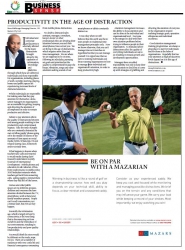Musa Makhunga, Managing Director, HR Matters (Pty) Ltd:Productivity in the age of distraction2016-06-23 Individual and corporate productivity is adversely affected by the many distractions brought about by the explosion of information, knowledge and platforms through which these are delivered. Individuals and those responsible for organisations, including places of work, worship, learning, playing, homes and public spaces are experiencing increased levels of distracted attention.
Whilst individuals are responsible for making sure that they pay attention for themselves alone, senior managers in organisations are accountable for getting, keeping and directing the attention of all employees in order to remain productive and effective. Failure to pay attention affects the quality of interactions between and among people resulting in low productivity and compromised outputs. Take the issue of pupils who are constantly distracted by own or fellow pupils’ phones going off in the middle of lessons or the amounts of time spent on social media (MXit, WhatsApp, FB and related) during class, homework and/or at study time. What happens to lessons when teachers take calls and respond to social media during class? Research undertaken recently (Journal Of International Development - Mobile phones and education in sub-aharan Africa:from youth practice to public policy 2016) indicates instances where teachers get back from answering calls, asking pupils to remind them where they had left off the lesson. Homes and other public spaces are no different; spouses, children and everyone else have attention divided between the TV, smartphone, work at hand and family members present. People can’t recall conversations, not a minute later, but even as they happen. Ironically the information age, which is largely driven by connectivity, is the very thing that is disconnecting us from ourselves and the immediacy of our environments; resulting in low productivity and poor quality relationships. You would think the story would be different on the roads, nope it’s not. There are a number of incidences with very costly life and financial consequences emanating from mobile phone distractions. No doubt a distracted sales assistant, manager, consultant, lawyer, doctor or other professionals who are dividing their attention between you and their smartphones, have served you. We are living in the age of distractions, which requires more than just time management. We are where we are supposed to be on time, following set schedules, pursuing set goals and priorities but the quality is compromised because the beeps, vibrations, songs and other attention seeking sounds of our smartphones or tablets constantly distract us. It was okay when we still believed that the earth was flat to train people on traditional time management principles only. Now we know otherwise, that you can’t manage time as it marches on regardless but that you can manage yourself. It is opportune that we turn to training individuals and those running organisations in how to manage their individual and organisation’s attention, in order to keep productivity high. Attention management increases the ability to focus attention and can be done at the individual and organisational level. Everyone is encouraged to deal with their own attention problems before trying to influence people in their organisation. As indicated above distractions affect the quality of everything individuals set out to do resulting in missed growth and development opportunities. Managers have an added responsibility not only to keep their own attention in check but to come up with strategies of grabbing and directing the attention of everyone in the organisation toward realising strategic goals, operation efficiencies and individual excellence. Good attention management training programmes are always a great place to start for individuals and for those at the helm of organisations. Hopefully this has your attention as high productivity levels depend on it in this age of distractions. musa@hrmatters.co.za www.hrmatters.co.za |
Musa Makhunga, Managing Director, HR Matters (Pty) Ltd:Productivity in the age of distraction
Copyright © 2024 KwaZulu-Natal Top Business
